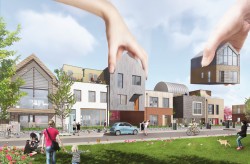Custom build has the potential to deliver exciting new communities with a range of homes geared to what owners actually want. Jon Sawyer, Head of Custom Build for igloo and Chair of NaCSBA’s Developer Group, explains why developers need to think differently.
All political parties recognise the importance of raising housing supply to 200,000+ net new homes a year. During the recession, when housing supply dropped to 110,000, the Coalition Government and Lyons Housing Commission both looked at ways to improve the existing supply models. However they concluded that new models were needed as the peak had only delivered 170,000 and the volume housebuilders had too much control over land supply.
In May 2012 the former National Self Build Association organised a trade mission to Holland along with former Housing Minister Grant Shapps. What they found was a housing market in which more than 25% of homes are commissioned by their residents, unlike the 10% achieved through self-builders in the UK. The key difference was the existence of a professional Custom Build market. Custom Build, which involves a developer helping a purchaser commission their own home, has taken off in Holland to the extent that whole communities are delivered this way. It is also used in many other overseas counties, which on average deliver more than half of their homes this way.
The Government has set a target of delivering 100,000 Custom Build homes by 2021 and has offered a number of incentives to help Custom Build get off the ground. These include 12 pilot sites, CIL exemption (the average CIL charging zone is about £7,500 per unit) and a £150m Serviced Plot Loan Fund. The real game changer comes in 2016 with the introduction of the Government’s ‘Right to Build’, which requires Councils to assess demand for Custom and Self Build and make land available to meet that demand. Research undertaken by the renamed National Custom and Self Build Association (NaCSBA) for the Nationwide Foundation has identified that about 1 in 4 Councils are already starting to explore options for creating demand registers.
As a result of this public sector support there are already more than 20 developers offering turn-key Custom Build solutions including a number of large players like igloo, Lovell, Places for People and Swan. The customer’s experience is very simple, choosing a serviced plot and then customising their home from a menu of design options. As well as greater choice another key difference is that the customer typically owns their plot whilst the home is being built for them. Developers charge less profit because of this pre-sale and this, along with other savings like lower stamp duty, helps to fund the bespoke design.
There is still a big consumer education programme that NaCSBA is spearheading, but the early signs for Custom Build are promising with 700 people visiting the first marketing event at Graven Hill in Bicester and 1,000 people visiting igloo’s website ahead of the first plot release. All developers are reporting faster sales with many customers citing choice and quality as their drivers for choosing Custom Build over a volume housebuilder product. In fact RIBA research has found that two thirds of people would never buy from a volume housebuilder.
Although some developers are using traditional brick and block, most developers are opting for timber frame, SIPS and factory-manufactured systems. To take advantage of this opportunity suppliers will need to be willing to take deferred payments. In the case of igloo, which is delivering the Government pilot at Heartlands in Cornwall, they will also need to form part of home manufacturer teams along with architects and builders.
Igloo’s 6 home manufacturer teams for Heartlands were selected following a competition that assessed price, deliverability and quality. The timber frame suppliers within the successful teams range from local Truro-based supplier Frame UK, to national player Potton and international firm Riko. All are joining a national framework that will have opportunities on igloo’s growing number of sites around the UK. To help igloo achieve the growth it is forecasting additional home manufacturer teams will be invited to join its framework from early 2016.
For more information visit: www.iglooregeneration.co.uk
Your House: Your Choice
1st November, 2015









